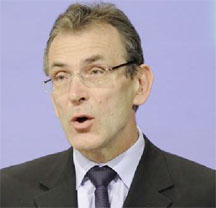Pledging €1 billion in grants, European Union (EU) Deve-lopment Commis-sioner Andris Piebalgs said yesterday that his bloc remains committed to strong ties with the region but he urged that the Caribbean improve project implementation and adhere to the highest standards of accountability and transparency.
“The world has changed, the Caribbean region has changed and EU cooperation policy has changed too… We are well aware that such a change of strategy will still require financial resources. As a result, the EU is ready to invest €1 billion under the 11th EDF in grants for the Caribbean region,” the EU Development Commissioner said.
Piebalgs was speaking at the opening plenary of the two-day 11th European Development Fund Caribbean Regional Programming Seminar at the Guyana International Conference Centre, Liliendaal. He announced plans for scaled up cooperation with Haiti and unwrapped the billion-euro grant promise under the new funding programme. The 10th EDF ends this year.

He said that if the countries agree he would like to see attention paid to security in the Caribbean, which has been given a prominent place in the joint strategy and needed to be addressed effectively in the future cooperation programme. Said Piebalgs “The Caribbean has been very hard hit by the global financial crisis; this has affected the key sectors of tourism and remittances, with serious implications on the level of indebtedness, the unemployment rate and the security situation. Security is a particular concern because it is a prerequisite for social and economic progress.”
He also pointed to climate change and its related impacts such as the rising sea levels saying that they continue to cast a long shadow over global development efforts and pose a major obstacle to sustainable development in the Caribbean.
He said the funds pledged were demonstrative of the EU’s renewed commitment to the Caribbean. “That commitment is reflected in a larger envelope for regional programmes and new implementation options for regional cooperation,” he said.
He singled out Haiti, which continues to face challenges in its restructuring from being hit hard by natural disasters and its ever present fight against poverty, as being able to benefit from scaled-up cooperation with the EU.
However, he stressed the need for the delivery of value for money adding that the organisation has been striving to set up new mechanisms for blending loans and grants. Over the two days representatives will analyse varying implementation modalities for regional programmes.
“In times of financial crisis and budgetary constraints, it is even more important to ensure the highest possible level of accountability and transparency. This will require clearer indicators and more mutual accountability. It will also require more donor coordination and alignment with national policies,” he said.
President Donald Ramotar in his address welcomed the continued support to Caribbean nations especially in the national resources, tourism and agricultural sectors with the latter mainly on reducing food import bills and creating food security.
However, he also called for a reappraisal of the Economic Partnership Agreement (EPA) to determine if tangible benefits have accrued to the Cariforum signatory nations since it took effect five years ago.
It was the development of human resources that Chairman of Cariforum Oliver Joseph stressed in his brief remarks. He said that focus should be on this main area – towards improving lives. “In our discussions we must put people at the centre. We represent the people and it is the people of the Caribbean’s lives that we are seeking to improve and therefore any changes, any strategy, any development cooperation must never lose focus of the fact that we are here to serve people,” he said.
Caricom Secretary General Erwin LaRocque echoed the call for human development. “Without human capacity development, Cariforum as a region cannot achieve global competitiveness, neither can it build sustainable economies,” he said.
However as he referred to the “twin principles of differentiation and graduation from access to grant resources”, LaRocque pointed out that elements of the new EU external aid policies were cause for concern for Cariforum.
“The use of per capita income to determine a country’s level of development and its need for grant and concessional financing, does not provide the true picture.” he said.
“Per capita income is, at best, an arithmetic ratio that does not address levels of poverty, distribution of income, levels of indebtedness, vulnerability, and the capacity to self-generate sustainable economic and social development,” he added.
He said Cariforum welcomes continued policy and political dialogue with the EU, particularly within the context of SIDS and the Post 2015 Development Agenda.
He pointed to key areas such as strengthening regional integration and cooperation processes, development of enterprise through private sector development, energy, education and skills development and food security among others that will be addressed over the days.
The EDF is the main instrument for providing community development aid in the African, Caribbean and Pacific (ACP) countries, which includes the Cariforum grouping, and the overseas countries and territories (OCTs). It is concluded for a multi-annual period (usually 5 years) and is implemented within the framework of an international agreement between the European Community and the partner countries. The 10th EDF (2008-2013) had a budget of €22 682 million, with €21 966 million to the ACP countries (97% of the total), €286 million to the OCTs (1% of the total) and €430 million to the Commission as support expenditure for programming and implementation of the EDF (2% of the total).




